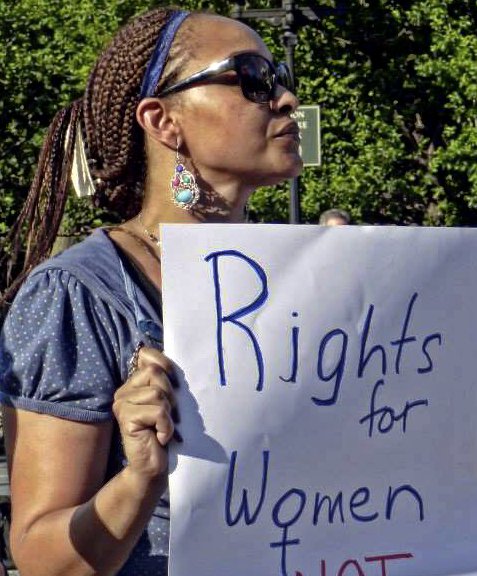

A bold giant step in defense of poor women’s right to abortion and for equal opportunity for all women took place on July 8. Democratic Congresswomen Barbara Lee, Jan Schakowsky and Diana DeGette introduced the Equal Access to Abortion Coverage in Health Insurance (EACH Woman) Act in the House of Representatives.
The bill would ensure that every woman who receives health care or insurance through the federal government would be covered for all pregnancy-related services, including abortion. “Regardless of how someone personally feels about abortion,” said Lee during the press conference at the Capitol, “none of us, especially elected officials, should be interfering with a woman’s right to make her own health care decision just because she is poor.”
If passed, the bill would apply to both federal and state laws and end “the terrible wrongs of the Hyde Amendment, which, for 37 years, have fallen hardest on people of color, low-income and youth,” said Yamani Hernandez, executive director of the National Network of Abortion Funds, which for years has carried the banner to end Hyde.
Passed in 1976, only three years after Roe v. Wade legalized abortion, the Hyde Amendment denied coverage for abortion services to poor women insured through Medicaid. This has had a widespread, discriminatory impact on one in six women of reproductive age (15 to 44) who are enrolled in Medicaid, half of whom are women of color. In 2008 (the last year for which statistics are available), Medicaid insured nearly 12.9 million women, who accounted for 61.8 percent of adult Medicaid enrollees.
While abortion is a routine medical procedure sought by one in three women in the course of their lifetime, statistics show that, as a result of Hyde, one in four women on Medicaid have been forced to carry an unwanted pregnancy to term. Studies also show that a woman who seeks an abortion but is denied one is more likely to fall into poverty than a woman who has access to an abortion, because of the high costs of child-rearing combined with low wages.
But the injustice of the Hyde Amendment also extends to millions of women who receive health care through the federal government: a million female federal employees and their dependents, 1.1 million women of reproductive age in the military, nearly a million Native American women covered by the so-called “Indian Health Services,” thousands of women in federal prisons and migrants in detention centers, Peace Corps volunteers and low-income women in the District of Columbia.
Emboldened by their control of Congress, anti-choice legislators now seek to further codify and expand Hyde, apply it to all government spending and put private insurance coverage of abortion out of reach for most women through a new bill, H.R. 7, which passed in the House in January. Legislatures in 25 states have already adopted restrictions that limit abortion in private insurance, with 10 states banning coverage in all private plans, except under very limited circumstances.
Taking the offensive
“We’ve been on the defense constantly,” Lee told Democracy Now! on July 9. “Now it’s about time we take the offensive, and say, ‘Look, there’s got to be some justice and some fairness, as it relates to all women.’” It’s important to note that Lee, an African American who has taken many progressive stands over the past 17 years in Congress, voted “no” to the U.S. war on Iraq, and is advocating for an end to the U.S. blockade of Cuba.
Lee admits that passage of the EACH Woman Act is a “long-term fight.” First, “we have to educate the public, which I believe is really there.” In fact, a Gallup poll issued May 29 showed that for the first time since 2008, 50 percent of those polled said they were pro-choice, while 44 percent said they are so-called “pro-life.” A Hart research poll in June showed that 86 percent of those surveyed believe that politicians should not limit a woman’s access to full health coverage because she is poor.
“We have to let members of Congress know,” said Lee, that the public believes “there should be equity and low-income women should be treated fairly. So we have a massive educational campaign to conduct” in Congress. Not daunted by the current odds, Lee noted, “We’re going to be very assertive. … This is a marathon. But it must start somewhere, so we’ve taken the very first step.”
Already 74 members of Congress are co-sponsors of the bill, which is also backed by 36 national and state health care, legal, women’s and reproductive justice organizations, united under a campaign initiated by All* Above All. Founded in 2013, All* Above All, led by women’s, reproductive justice and youth organizations, is a diverse national effort devoted to lifting bans that deny abortion coverage, “so that every woman, however much she makes, can get affordable, safe abortion care when she needs it.”
Educators for Palestine released the following news release on July 19, 2025. Washington, D.C. Educators…
On July 17, a court in France ordered the release of Georges Abdallah, a Lebanese…
The following are highlights from a speech given by Yemen’s Ansarallah Commander Sayyed Abdul-Malik Badr…
Panamá Beluche is a sociologist, professor and anti-imperialist organizer in Panamá, writing here about the…
Download the PDF Farmworkers organize three-day strike Palestinian factions demand an end to the famine…
In the more than 650 days since the Al-Aqsa Flood (October 7, 2023), a remarkable…